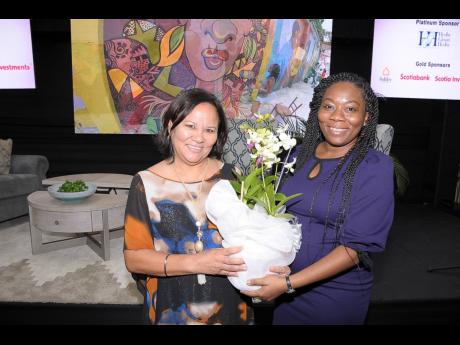Michelle Chong, chief executive officer (CEO) of Honey Bun Limited and Founder of The Honey Bun Foundation, has pointed to the creative sector as a source of great potential to grow the Jamaican economy, declaring the sector Jamaica’s greatest competitive advantage.
“The future is the creatives,” she said, while addressing the Women in Law conference, held on Sunday, March 8, at The University of the West Indies (UWI) Regional Headquarters in Mona St Andrew, where she was the keynote speaker
“There are three main reasons that I can offer to support this claim. First, creativity thrives through adversity. The second reason is that our skills are innate; and, third, Brand Jamaica is our ticket to economic rejuvenation,” she said.
“Throughout history, our people have had to express themselves to manage their hardship. Without knowing it, we have had to beat drums and ‘sing a sanky’ to cope. Art is a coping mechanism. Hardship still has not gone away. We still have poverty, crime, garrisons, and corruption. It’s hard to imagine that those things are food for our culture; but if we can use them to create something greater to get us out of our entrapment, then we need to use it,” said Chong.
FOSTERING CREATIVITY
The CEO pointed to research done by Paul Goodchild which point to the role played by adversity in fostering creativity. The article states:
“Psychologists now have a label for the process whereby people respond positively to serious difficulties. They call it post-traumatic growth, and it is characterised by a growing appreciation for the positive parts of our lives, greater spirituality, and increased ability to think creatively’.”
She added that another point for the creative industry being Jamaica’s greatest competitive advantage is the lack of proper education for a broad sector of our society. “Again, is this another adversity that we can convert? I am by no means saying that it’s a good thing not to be educated, but when we think of creativity, it requires less formal education and compared to our global competitors, what other space do we occupy to be competitive? In most industries, we are competing with strong, knowledge-based resources, highly trained in technology, engineering and science. Yes, we should invest more in education, but if we wake up and we’re spending all our resources on education, when do we expect to see the benefits? Perhaps the next generation? Great! But can we afford to wait? No,” she said.
Chong said her third reason for saying that the creative industry is Jamaica’s greatest competitive advantage could be summed up in two words – Brand Jamaica.
“We have talked and talked about Brand Jamaica for so long. But we are not monetising our Brand Jamaica and Brand Jamaica is our creative industry,” she said, noting that she founded The Honey Bun Foundation last year to help members of the creative industry and small and medium enterprises (SMEs) to monetise their talents and grow their businesses.
“The Honey Bun Foundation’s mission is to develop powerful business models for SMEs and the creative sectors to become transformational industries for Jamaica’s economy. We will do this through undivided focus on the business component. We have four areas of this model that we will engage over the next three years:
1. A national training calendar which centralises training opportunities available from different institutions, making it more convenient for members of the creative industry to source the opportunities best suited to their needs;
2. A Gap app, which is a diagnostic tool for businesses;
3. Advisory boards;
4. Back-office support.
“We will engage the private sector to support our vision for SMEs and the creatives to move the needle exponentially,” said Chong, adding that the work of The Honey Bun Foundation is built on two pillars – collaboration and leadership.
Published:Friday | March 13, 2020 | 12:17 AM – http://jamaica-gleaner.com/article/news/20200313/honey-bun-chief-touts-potential-creative-sector




